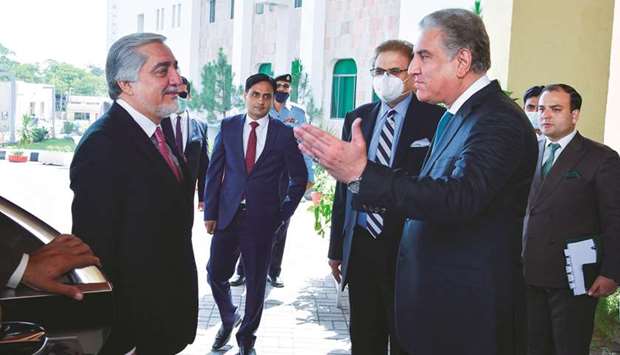The Afghan official overseeing Kabul’s efforts to forge a deal with the Taliban arrived yesterday for a three-day visit to Pakistan, the influential neighbour considered vital to the peace process.
Dr Abdullah Abdullah, previously Afghanistan’s chief executive, was meeting senior officials in Islamabad for the first time as chair of his country’s High Council for National Reconciliation.
Islamabad has said its influence over the Taliban encouraged the insurgents to hold talks with Washington that led to a February deal paving the way for a US military withdrawal and current peace talks.
“Pakistan fully supports all efforts for peace,” its foreign ministry spokesman said in a statement.
The United States has acknowledged Pakistan’s help in fostering Afghan peace efforts including in encouraging the Taliban to negotiate.
The US special representative for Afghanistan, Zalmay Khalilzad, said last week that the United States and its allies were looking at an agreement between Afghanistan and Pakistan so that neither side’s territory would be used to attack the other.
Khalilzad was the architect of the February pact between the US and the Taliban.
“Abdullah’s visit will greatly help to strengthen relations with Afghanistan and forge a common understanding on the Afghan peace process,” the foreign ministry statement said, after Abdullah met Foreign Minister Shah Mahmood Qureshi.
“Qureshi underlined the high importance Pakistan attached to its brotherly relations with Afghanistan,” the statement read, adding that the return of millions of Afghan refugees currently residing in Pakistan must be included in peace talks.
At his meeting with Qureshi, Abdullah expressed his gratitude to Pakistani leadership over its role in the Afghan peace process.
Qureshi said Pakistan backs a peaceful and durable political solution of Afghanistan’s conflict through an Afghan-led and Afghan-owned peace process.
The minister said the Afghan leadership should seize this opportunity and undertake serious efforts to take the Afghan peace process to its logical conclusion.
He warned, however, that there are “spoilers” who do not want peace and stability in the region.
During his visit, Abdullah will also meet Prime Minister Imran Khan.
Negotiations in Doha started September 12 but have slowed as the two sides grapple with several foundational issues.
“Definitely things take time,” Khairullah Khairkhaw, a senior member of the Taliban negotiating team, told reporters in Doha. “There are many issues, 20 or more, that need clarity.”
Nader Naderi, a member of Kabul’s negotiating team, said both sides would meet later to discuss several pressing topics, including a ceasefire.
“The key issue for us is a ceasefire and we are still talking about it (with the Taliban),” he stated.
The Taliban ruled Afghanistan between 1996 and 2001, when it was ousted by a United States-led invasion.
It has fought the government in Kabul for nearly two decades in a conflict that has left tens of thousands of people dead.
Violence has continued unabated across Afghanistan even during the talks.
Prime Minister Khan, in an opinion piece in the Washington Post on Saturday, expressed concern that Afghanistan could again be used as a haven for international militant groups and warned that a “hasty international withdrawal from Afghanistan would be unwise”.
There have also been concerns that the Afghan peace process could increase militancy in Pakistan as fighters now in Afghanistan seek refuge on the Pakistani side of the border.

This handout picture taken and released by the Pakistan ministry of foreign affairs shows chairman of the High Council for National Reconciliation of Afghanistan, Dr Abdullah Abdullah, being welcomed by Foreign Minister Shah Mahmood Qureshi at the ministry in Islamabad.
